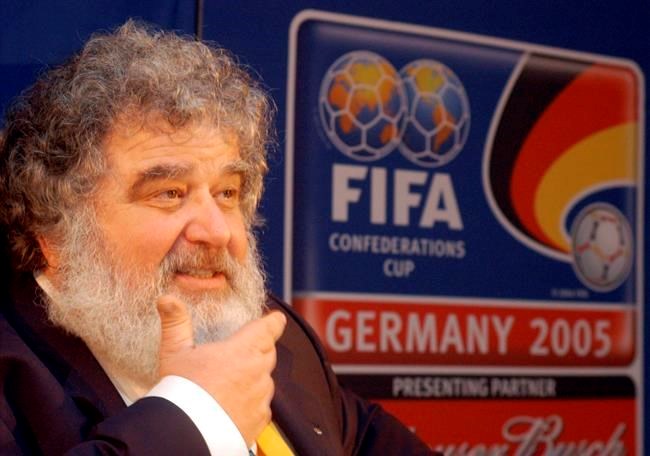NEW YORK — The charade only ended in the final years of Chuck Blazer's life.
Stripped of his extravagances, soccer's gregarious and greedy dealmaker was forced to admit to his years of corruption and confined to a New Jersey hospital.
The eccentric bon vivant who once strode across the global stage being flattered by sport and political leaders eager to capture his World Cup hosting vote died in disgrace on Wednesday at age 72.
However much Blazer elevated the status and wealth of soccer in North America over several decades, any achievements were polluted by the ravenous appetite of "Mr. 10 Percent" to seek bribes and siphon cash from deals into his personal account.
Blazer did go on to play a central role exposing soccer's fraudulent culture, which led to FIFA President Sepp Blatter being toppled. But he turned only when presented with little option but to become a
The impact of Blazer's death on the FIFA prosecution in the United States — where three South American soccer officials are set to go on trial in November — is unclear. Many of the more prominent figures who might have faced him as a star government witness have already pleaded guilty.
Any recordings Blazer made after agreeing to become an FBI informant and wear a wire could still come into evidence without his testimony, said Timothy Heaphy, a former U.S. attorney now in private practice.
Even if Blazer didn't record the defendants, prosecutors could have tried to "call him to testify generally about the ways and means of the corrupt practices, as pseudo-corruption expert," Heaphy said. But Blazer's absence, he said, "is like one brick removed from the wall. It won't make the edifice come crumbling down."
Blazer was driving his mobility scooter on a Manhattan street in 2011 when he was stopped by U.S. government agents and threatened with arrest.
It was the failure to fill in tax returns for years that put Blazer on the radar of the Internal Revenue Service. He became a government informant in 2011, using his role on FIFA's already-tainted executive committee to secretly record conversations with associates in soccer's governing body.
Blazer swept up evidence that formed the foundations of a Department of Justice case against world soccer executives who embezzled cash from commercial contracts and sought payments in return for backing countries as World Cup hosts.
At a November 2013 court hearing where his treatment for rectal cancer, diabetes and coronary artery disease was disclosed, Blazer entered 10 guilty pleas. He admitted to sharing in a $10 million bribe scheme with others to support South Africa's bid for the 2010 World Cup, and facilitating a kickback linked to Morocco's failed bid for the 1998 World Cup.
Blazer's guilty pleas were only unsealed by a New York court in July 2015 after the American investigation into FIFA exploded into public view with a raid on a Zurich hotel ahead of the annual gathering of soccer nations.
Since then, U.S. prosecutors have brought charges against more than 40 soccer officials, marketing executives, associates and entities, while the Swiss attorney general has been conducting parallel investigations.
"Chuck hoped to help bring transparency, accountability and fair play to CONCACAF, FIFA and soccer as a whole," Blazer's lawyers said in a statement late Wednesday. "Chuck also accepted responsibility for his own conduct by pleading guilty and owning up to his mistakes. Chuck felt profound sorrow and regret for his actions."
While some sports executives try to shirk the limelight, Blazer relished the status gained through his 16 years on FIFA's executive committee until 2013.
For a suburban soccer dad, Blazer gained unimaginable influence and access. Journeys into the heart of power across the world were cataloged on a personal
When he wasn't
Blazer started in soccer by coaching his son's club in New Rochelle, New York, and joined boards of local and regional soccer organizations. He was the U.S. Soccer Federation's executive
Blazer urged Jack Warner to run for president of CONCACAF in 1990. When the Trinidadian won, he made Blazer the general secretary — a position he held until 2011.
In 1991, Blazer created the CONCACAF Gold Cup, the organization's national team championship that is played every two years, and he rose within FIFA to become chairman of its marketing and television advisory board.
Blazer turned on his boss, Warner, who also served with him on FIFA's executive committee.
Corruption had been
Blazer's conduct was as corrupt as the actions of the people he accused.
Blazer pleaded guilty in November 2013 to one count each of racketeering conspiracy, wire fraud conspiracy, money laundering conspiracy and
A separate CONCACAF investigation report released in 2013 said Blazer "misappropriated CONCACAF funds to finance his personal lifestyle," causing the organization to "subsidize rent on his residence in the Trump Tower in New York; purchase apartments at the Mondrian, a luxury hotel and residence in Miami; sign purchase agreements and pay down payments on apartments at the Atlantis resort in the Bahamas."
"His misconduct, for which he accepted full responsibility, should not obscure Chuck's positive impact on international soccer," his lawyers said. "With Chuck's guidance and leadership, CONCACAF transformed itself from impoverished to profitable."
While Blazer was banned for life from soccer by FIFA in 2015, he was awaiting sentencing when he died.
There were almost no public tributes from FIFA or CONCACAF after his passing; CONCACAF merely said it extended "sympathies and condolences" to Blazer's family and loved ones. The only acknowledgement of Blazer's death by U.S. Soccer was a comment in a news conference by national team coach Bruce Arena.
"I've known Chuck for a lot of years. He did a lot for the sport. Sorry about all the issues regarding FIFA," Arena said. "But he was a good man."
___
Harris reported from Silverstone, England. AP Sports Writer Ron Blum contributed from New York. AP freelance writer Mark Didtler in Tampa, Florida, contributed to this report.
Tom Hays And Rob Harris, The Associated Press

